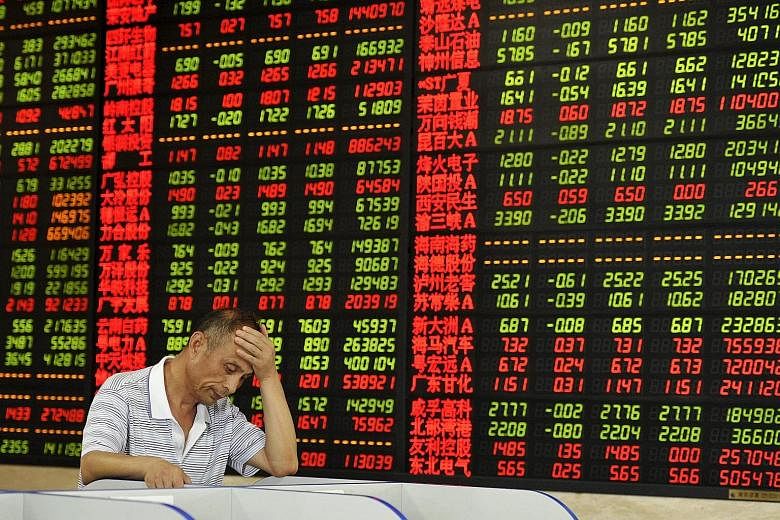China's recent stock volatility has tested the nerve of even the most risk-loving investors. The nation's domestic equities have gone from being the world's best-performing major stock market in 2015 to being the fastest-falling. After hitting a peak in mid-June, Chinese shares lost more than US$3.5 trillion (S$4.9 trillion) in value in just a month - equivalent to roughly the entire capitalisation of listed stocks in Britain.
That has been enough to worry investors with no direct exposure to domestic Chinese shares. But could the turbulence on the Shanghai and Shenzhen exchanges spread to global markets? We think not.
Some degree of concern is understandable. For a start, the Chinese market has so far seemed relatively impervious to government efforts to restore calm. A raft of measures to prop up stocks, including the establishment of a fund by local brokers to buy stocks, did not prevent an 8.5 per cent slide in the Shanghai Composite on July 27 - the largest one-day fall since 2007. Such manipulation is also a setback for international confidence in the integrity of the Chinese market.
What's more, we have already seen some spillover into the internationally traded Hong Kong market. Government measures to discourage investors from selling domestic stocks led some to use the freely traded Hong Kong market as a sort of ATM, causing the MSCI China Index to slide too.
Despite these concerns, the contagion should stop there. For a start, international investors hold only about 1 per cent of their global portfolios in domestic Chinese stocks. As a result, it is hard to imagine them being forced to sell down securities elsewhere to cover the losses in China.
A greater worry has been that the recent wealth destruction will increase the danger of a sharp slowdown in China's growth - a development that would take a heavy toll on global demand. Again, we see the threat as relatively limited.
Chinese citizens still have relatively limited exposure to the market. Stockholdings account for just 20 per cent of household financial wealth, compared to 53 per cent in bank deposits. There was no evidence that Chinese citizens rushed to the shops to spend their new equity wealth after the Shanghai market surged 180 per cent in the year to mid-June. So we would not expect a sharp drop in consumption either as part of this paper wealth disappears.
In addition, a big part of the stock market is controlled by government entities and companies - neither of which are likely to cut back spending in response to paper losses. The free-float of Chinese domestic stocks - the part of the market that is available for trading - is equivalent to roughly a third of GDP, compared to about 100 per cent for most developed nations.
Nor are there indications that funding for companies may dry up. China's firms still rely overwhelmingly on bank loans and corporate bonds to fund expansion. Amid the stock frenzy, the domestic debt market has remained calm. To put this in perspective, equity financing accounted for just 4.2 per cent of China's social financing in the first five months this year - a measure that includes lending by banks and the shadow banking system.
Of course, the risk of an indirect hit to confidence can't be completely discounted. A continued slide in stocks could cause some Chinese citizens to worry about a similar slide in the housing market, where far more wealth is concentrated.
This is not our base case. But even if such a blow to sentiment does occur, we remain confident that the Chinese state has the determination and policy flexibility to head off an economic hard landing.
China's US$3.6 trillion foreign exchange war chest accounts for a third of the global total. The state-controlled banking system can be deployed to step up lending if demand slows too abruptly.
Beyond China, economic growth remains surprisingly anaemic across Asia. While some modest acceleration in the second half of 2015 is expected, we have reduced the level of risk in our tactical investment strategy in Asia outside Japan to reflect the more challenging environment. We continue to like Asian high-yield bonds, a segment dominated by Chinese issuers, which are key beneficiaries of ongoing policy support and the property market rebound. This asset class has proven resilient during the equity market rout. At its worst, the drawdown was just 2 per cent, and even that proved short-lived.
Ahead of the US Federal Reserve's likely interest rate hike in the second half, Asian currencies could fall a further 2-4 per cent against the US dollar. As for the Chinese yuan, prospects for its inclusion in the International Monetary Fund's Special Drawing Rights at the upcoming review are unlikely to be hurt much by the recent stock market rout.
Outside of Asia ex-Japan, the two equity markets where we see potential are the euro zone and Japan. Euro zone corporate earnings growth finally turned positive in the first quarter of 2015, with European Central Bank policy providing a supportive backdrop. Profits in the region still have room to catch up with their longer-term trend and should drive continued outperformance. As for Japan, it now boasts one of the fastest earnings-growth profiles globally. Beyond the weak yen, which remains an ongoing driver, stronger-than-expected consumption is starting to take hold. This is in part due to decent wage growth - we believe the largest wage hike in 10 years of
3 per cent year-on-year since April will be followed by a similar increase next year. Furthermore, the launch of the Corporate Governance Code in June should usher in a new wave of share buybacks among Japanese firms.
The bottom line is that while China's stock market woes are another reminder of the wisdom of holding a diversified portfolio, we do not believe the infection will spread to global markets.
• Tan Min Lan is head, Apac Investment Office, at UBS CIO Wealth Management

